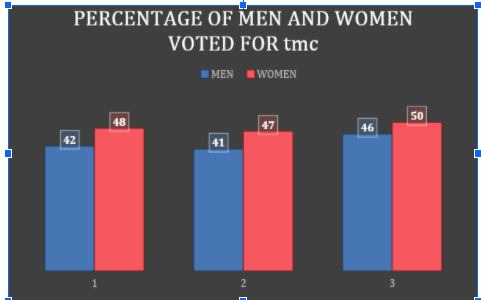Political empowerment of ‘Chandi’ and her influence in Bengal elections
Posted on : June 21, 2021Author : Bhagyeshree Pujari

The Trinamool Congress (TMC) launched by Mamata Banerjee in the year 1998, won the current 2021 West Bengal assembly polls, despite of poll pundits predicting anti-incumbency. The article traces the victory of the TMC in the light of women’s voter turnout.
Suffrage is the right or privilege of voting and is frequently incorporated among the rights of citizenship (the duties and privileges of a person owing loyalty to and entitled by birth or naturalization to the protection of a state or nation). However, in general “woman suffrage was almost unheard of up to the middle of the nineteenth century” (Porter, 1969). In India, in 1947, at the dawn of Indian independence, the framers of the constitution entitled citizens of India 21 and older, the right to vote, including women, as per article 326 of the Constitution of India, which was amended to reduce the minimum voting age to 18 years by the 61st Amendment, effective from 28 March 1989. The political empowerment of women gained momentum post-1980s that witnessed the passage of Panchayati Raj constitutional amendments that provided a 33 percent women reservation.
India, since past decade, has been witnessing a trend of rise of women voters that are influential in impacting the electoral outcomes, Bihar, Odisha, West Bengal, Arunachal Pradesh and Tamil Nadu, being the classic examples. In the 1962 Lok Sabha polls, for which the Election Commission for the first time presented separate numbers for male and female voter turnout, women constituted a measly 46.7%. (Election Commission of India, 1962). But by 2019, the share had shot up exponentially by nearly 20 percentage points to 67.18%. During the same period, men’s turnout grew by only 5 percentage points—from 62.1% in 1962 to 67.08% in 2019. The turn-out is on rise in many of the Indian states, affecting the shift of the winning crown. In Bihar, the National Democratic Alliance (NDA) garnered 37.26% of the votes polled and won a narrow victory with 125 seats out of these 99 came from Assembly seats where the women’s turnout exceeded the male turnout. A phase-wise analysis of the Bihar verdict gives us a better understanding of how the women’s ‘silent’ vote influenced the outcome and tilted the balance in favour of Minister Nitish Kumar, despite anti-incumbency, which is also a trend witnessed in West Bengal assembly election. Hence, the BJP’s renewed focus on women voters in West Bengal also comes from this victory. Moreover, The CSDS survey showed that women from households that had availed the scheme were 42 percentage points more likely to vote for the AAP than BJP. Hence, rather than communal model, service model, rather a feminist service model, is witnessed to do wonders as the case is in the West Bengal, which is also the reason of BJP renewing its focus on women’s voter.
Popularly known as “Didi”, Mamata Banerjee, served two terms as railway minister, and played a crucial role in highlighting the state’s alleged atrocities on the people of Nandigram and in supporting the farmers of Singur when they protested against the land acquisition by the state for the Tata Nano project. The Trinamool Congress was launched by Mamata Banerjee in the year 1998, it is an All-India party but with a regional character operating mostly in West Bengal. The party has won the current 2021 West Bengal assembly polls, despite of political analysts predicting anti-incumbency trend initiated by the BJP to “woo Mamata’s “silent voters” into its camp with its women-centric manifesto. The BJP bulldozer came with great force to crumple Banerjee and the citadel of secularism- West Bengal. On the contrary to the ‘communal’ efforts of BJP hidden under the blanket of women’s empowerment, lost miserably to women’s empowerment. The vote share of the Trinamool Congress was up to 48% and that of the BJP was 37% .i.e. BJP lost by 11%of its vote of share. Women’s voter turnout has proven, once again, to be a master stroke and an electoral game changer. However, feminist wave was warmly welcomed by Mrs. Banerjee, ever since 2011 election. As the below bar graph represents, since 2011, the ‘Mamata’ factor has been successful in succumbing women’s vote through vacuum of ‘feminist’ policies. The growth rate of women voters since the rise of Banerjee is been high than that of men by 2 to 3 percent. As per the Lokniti data, the women’s support for the TMC has surpassed men’s support for the party. Also, in the 2016 Assembly Election, the percentage of women’s voter in support of TMC was 6 percent higher than that of the men voters.

(Source, the Election Commission of India, 2021).
While underrepresentation of women is an “old normal” in Indian states, West Bengal is an exception. The major reasons for her victory is the women voter and a shift to the major slogan of Bangla Nijer Meyke Chai ( Daughter of the soil), arousing anti-outsider sentiments against BJP and highlighting the atrocities (like Hathras) faced by women in BJP-ruled states of the Hindi heartland, further putting the TMC’s women-centric initiatives of the state government like Kanyashree (girls are provided financial support for their education), Rupashree (direct cash transfer scheme to provide women one-time financial assistance of Rs 25,000 for marriage), Muktir Alo (A rehabilitation effort for sex workers and women rescued from human trafficking), Swasthya Sathi (families have been provided health insurance benefits under the universal scheme), SABLA (aimed to improve the health and nutritional status of adolescent girls in seven districts in West Bengal, with a special focus on adolescent anaemia), and Widow Pension (A special pension scheme in which widows get Rs 1,000 per month), schemes into highlight. However, not to forget the charisma of the chief minister that become the sole custodian of power and a true political identity. Where the Prime Minister tried reinforce gendered roles of “Chool ani Mool” (Hearth and the child) through ‘Ujwala Yojana’, Banerjee’s Kanyashree scheme won the United Nations Award. In addition to the schemes, Banerjee’s government under the campaign of ‘Duare Sarkar’ (government to the doorstep of the people) reached across districts, assemblies, blocks, towns, Aanchal (gram panchayats) and touch the individual booths and the houses that fall under those booths by activating its Mahila cell (Women Frontal). The Mahila cell has been reaching out to women, and carried the 10-years report card of the State Government, visiting card of Mamata Banerjee that has Didi Ke Bolo phone number through which the residents of West Bengal can register their grievances. Through the cell, Banerjee has set the ball of political engagement rolling and made the women of the state believe that they serve a specific purpose. To top it off, she had organized Saheli Sabhas’ throughout all 341 blocks to ensure that every woman benefits from government programs and also promised uniformity in giving promotion to women constables, assistant sub-inspectors, sub-inspectors and inspectors posted at ‘unarmed branch’ of the police department. The chief minister tracked and tackled factors like low awareness about or participation in electoral activities (Iyer and Mani, 2019), or a lack of ambition and political thought and leadership (Fox and Lawless, 2010), or even restrictions due to concerns for safety (Borker, 2017) that inhibit the path of political empowerment and equality of political status for women in India.
The constant efforts of the chief minister to bring women in limelight of Bengal politics is the reason for the greater women’s voter turnout in the West Bengal’s history, and apparently in the history of India, that led to the TMC’s victory in 2021 assembly election. Hence, not only the charisma of the West Bengal chief minister – Mamata Banerjee, but also women’s voter turnout depicting greater class consciousness amongst them, played the role of kingmaker. However, though policy initiatives and grassroots rubrics followed by the party, along with women voter’s turnout serving as the constant immediate cause of the party’s victory, the anti- Modi or ‘resign Modi’ wave in the rest of the country, especially in Yogi Adityanath ruled state of Uttar Pradesh, subtly played a blanket role in lessening the grip of the party in West Bengal. The wave was highlighted and used as armour to turnover anti-incumbency wave. Ms. Banerjee remarked contemptuously, ‘Yogi should try to put his own house in order before talking about other states’. Additionally, the BJP was accused of marginalizing the state’s schemes for empowering women and of insulting the Hindu goddesses Durga and Sita. The rallies of Banerjee also highlighted religious intolerance in the passage of the Triple Talaq law and Love Jihad Law.
Greater women’s turnout in Bengal stands in contrast to James Mill’s view who opined that women and their family’s interests align, and hence rose an argument that claims women’s concerns as distinct from men. It is also an exceptional case in the context of the study of the UN development agencies based in India that says women have little or no say in decision-making at all levels of society. Mamata Banerjee gave women a liberated atmosphere, rather empowered to build a greater consciousness within themselves, and the century old theory of women’s silent submission to the patriarchs of the family while voting received a silent burial. As political scientist Neelanjan Sircar says, Ms Banerjee’s politics of “gender and welfare” had provided an ideal counter-narrative to that of the BJP. In West Bengal process of feminisation of Indian politics is evident where the support of female voters stands crucial, reinforcing the importance of women as a voting bloc in India, further depicting equal relevance of ‘the Goddess Durga/Chandi narrative’ as of ‘the Lord Ram rhetoric’.
Bhagyeshree Pujari
Intern, AGA
The views, thoughts, and opinions expressed in the text belong solely to the author in her personal capacity.





Leave a Reply